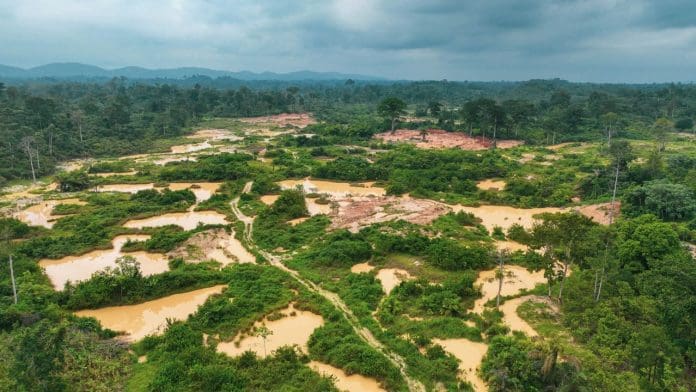The government has begun formal proceedings to scrap legislation governing small-scale mining operations, bowing to intense pressure from environmental groups demanding stronger action against illegal mining activities.
Acting Environment Minister Emmanuel Armah-Kofi Buah has written to the Attorney General requesting revocation of Legislative Instrument 2462 and its amendment, marking a significant policy reversal for the administration.
The decision comes amid mounting criticism over environmental destruction caused by unregulated mining operations, known locally as galamsey. Activists have linked these activities to widespread forest degradation and water pollution across mining communities.
Recent tragic events have intensified calls for government action. A helicopter crash that killed eight people has been connected by activists to the dangers created by unchecked mining operations, though the government has not confirmed this link.
The National Democratic Congress had promised during its opposition years to completely revoke the mining legislation. However, after taking office, the party initially chose to amend rather than abolish the law, drawing sharp criticism from environmental advocates.
Critics argued that the amendment actually weakened protections against illegal mining rather than strengthening them. Civil society groups maintained pressure for complete revocation of the legal framework they viewed as inadequate.
The proposed changes would consolidate regulatory oversight under the Environmental Protection Authority, giving the EPA stronger powers to enforce environmental and social compliance across the mining sector.
Under the new framework, mining companies would face stricter environmental standards and enhanced monitoring of their operations. The government says this unified approach will better protect forests and water sources from mining damage.
The revocation represents a major shift in Ghana’s approach to small-scale mining regulation. While the move may increase compliance costs for companies, officials argue that long-term environmental benefits justify short-term economic adjustments.
Mining contributes significantly to Ghana’s foreign exchange earnings, making sector reform both an environmental and economic priority. Stakeholders recognize that sustainable mining practices are essential for preserving the industry’s long-term viability.
Environmental activists have welcomed the government’s decision but emphasize that implementation will be crucial. Previous regulatory efforts have struggled with enforcement challenges that allowed illegal operations to continue despite legal prohibitions.
The success of the new regulatory framework will depend largely on the EPA’s capacity to monitor compliance and prosecute violations. Strengthened enforcement mechanisms will be essential for translating legal changes into real environmental protection.
Forest reserves and water bodies across Ghana have suffered extensive damage from unregulated mining activities. Restoring these ecosystems will require sustained effort beyond just changing regulations.
Communities affected by mining pollution have long demanded stronger government intervention. The law revocation signals responsiveness to these concerns, though residents will be watching closely to see whether enforcement improves.
The mining industry will need to adjust business practices to meet enhanced environmental standards. Companies that invest in sustainable operations may find competitive advantages in the reformed regulatory environment.
International pressure has also influenced the government’s decision. Ghana’s environmental reputation affects its ability to attract responsible investment and participate in global sustainability initiatives.
The revocation process will likely take several months as legal procedures are completed. During this transition period, existing mining operations will continue under current regulations while new frameworks are developed.
Source: newsghana.com.gh











